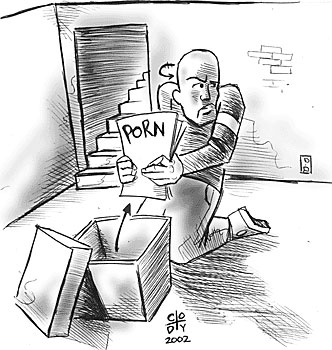
Illustration by Cody Angell
|
By Daniel Cucher
Arizona Daily Wildcat
Tuesday November 19, 2002
Last week, Tucson hosted the 2002 Sex Worker Arts Festival. The events ranged from academic lectures like "Sex Slaves and the Truth About Trafficking," hosted on the UA campus, to workshops such as "Fisting: Pleasuring Your Partner With Your Hands," which included a live demonstration and was hosted, not surprisingly, off campus.
Juliana Piccillo, co-director of the festival, told the Arizona Daily Star that the festival was "educational (and) community building," to promote acceptance because "sex workers are marginalized."
By selling itself as educational and artistic, the festival received a $2,700 grant from the Tucson/Pima Arts Council, which is funded by tax dollars. Consequently, whether or not local taxpayers (like you) agreed with what the festival set out to promote, they helped pay for it.
As long as our tax dollars and college classrooms are being used to advance a cultural movement, it is our responsibility to critique the movement and decide whether or not we approve of the social trend it indicates. In this case, we're talking about the increasing sexual permissiveness of our society, exemplified by the mainstream popularization of pornography.
This is not to be confused with the general popularization of pornography, which has been occurring for the past several thousand years. The difference is that porn, at least in this country, has been segregated from the mainstream.
While mainstream television and magazines perpetually add more graphic sexual content, they are still regarded as distinct from what is called pornography. For example, one may freely display magazines that feature sexually explicit, but censored, photographs, like Maxim and Stuff. However, it is not common practice to have flagrantly pornographic magazines sitting on one's coffee table.
Pornography is brushed under the table. It is a social taboo despite the fact that millions partake. Our society has a dual personality: We support the multi-billion dollar industry with our money, and at the same time we censure it by regulating where it can be sold, who can buy it and what is unacceptable. We both acknowledge its place in our culture and also regard it as a source of embarrassment. When Rudy Giuliani set out to clean up Times Square, the sex shops were the first to go.
Piccillo is absolutely correct in asserting that sex workers are marginalized. What's the alternative? Should the Academy add an award for porn stars? They could give an Oscar to the best leading actress in a gang-bang. How about a congressionally mandated Sex Worker Appreciation Day? We could gather in parks to demonstrate against censorship and maybe have a lap dance.
Pornography is a massive subculture ÷ and it is a subculture for a reason. Our collective social consciousness wants it this way. We want to keep it private, quiet, in a box in the attic. The Sex Worker Arts Festival aimed to do the opposite: to put porn into the mainstream, to gather people from all around Tucson to hear what porn stars have to say about their jobs and about sex. They wanted people to walk away thinking, "Gee, you know, strippers are people, too. And hookers write such meaningful poems!"
And indeed, strippers are people, too. But did the festival come to town to humanize the self-objectified sex workers of the world? Did they want to indulge us in the rich history of prostitute poetry? Was their goal to celebrate the diverse and lesser appreciated forms of sexuality? To spread S&M awareness?
Yes. But only to obliterate the stigma around commercial sexuality ÷ to make it more socially acceptable for us to solicit a prostitute, hire a stripper and proudly display hardcore magazines on our bookshelves.
Let us remember who sponsored the event. Aside from the few thousand granted by our local government, the festival was primarily funded by sex shops, sex-toy makers and other members of the porn industry.
The Sex Worker Arts Festival last week was essentially a plot to make mainstream and acceptable what our old-fashioned ethics regard as indecent. The increasingly permissive network television shows indicate that this trend is at least decades in the making. It is becoming more and more acceptable to exploit people sexually in order to make money.
Considering that this latest wave of "sexual liberation" is being maneuvered by the ethically-void, money-driven media (be it mainstream or pornographic), we should take a step back to consider what of our sexual underworld we should allow into the mainstream.
We must constantly ask ourselves where to draw the line. Saying "anything goes" and leaving our sexual ethics up to network television and traveling porn festivals is a surefire way to ensure that our children have an even more skewed perception of human sexuality than we do.

